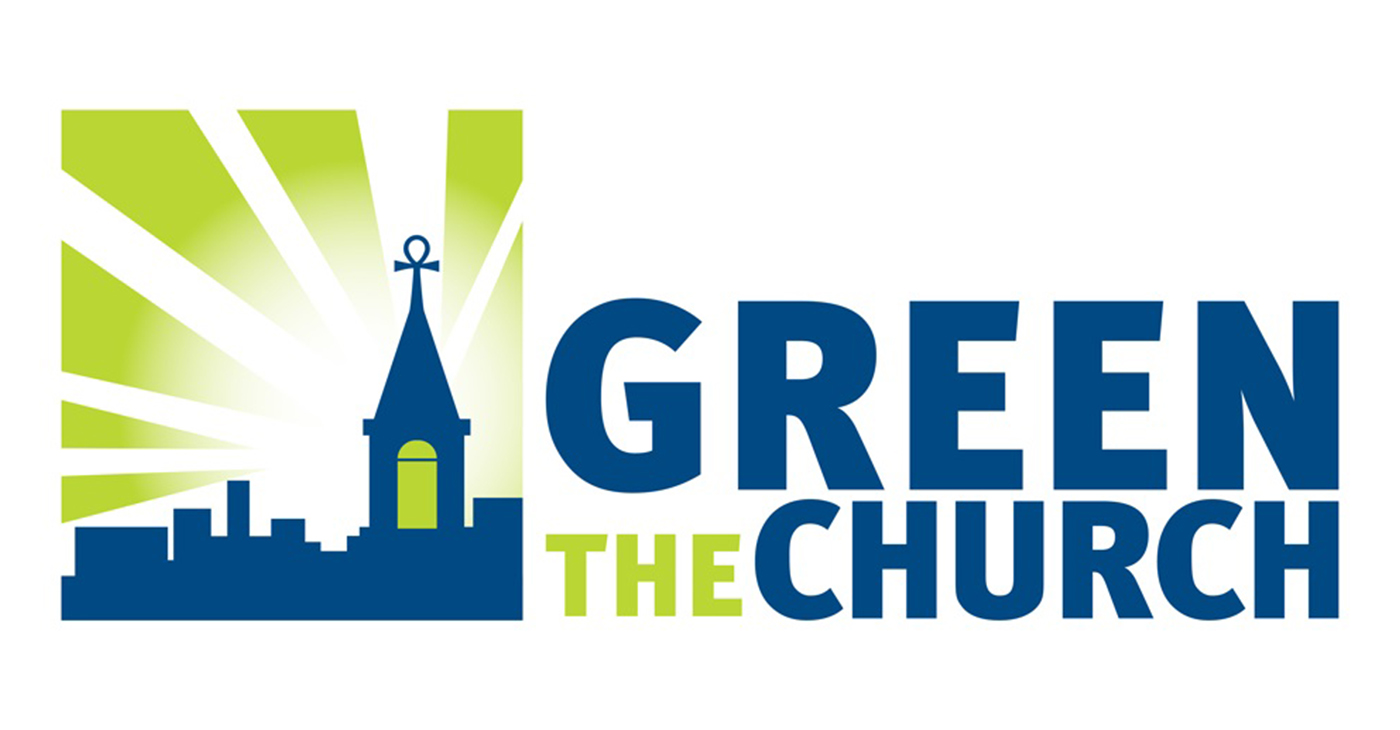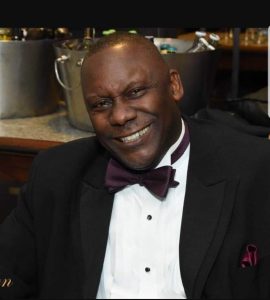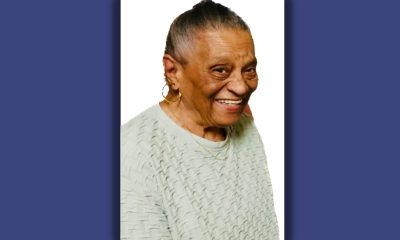Activism
White House Praises California Model; Says Equity Is Critical in COVID Fight
California was among the first states to start tracking racial data to determine why the disease, based on early infection patterns, was disproportionately impacting Blacks, Latinos and Native Americans. Although the rate of infections by race narrowed over time, the Centers for Disease Control and Prevention (CDC) and California Department of Health data still show higher COVID-19 death rates for African Americans than the general population.

By Aldon Thomas Stiles | California Black Media
Last week, Dr. Cameron Webb, the White House COVID-19 Response Team’s Senior Policy Advisor for Equity, discussed with California Black Media (CBM) the importance of fairness in the country’s fight against COVID. He complimented California’s pandemic response model.
“There has been a great model in California, which has always been a leader in some of these equitable initiatives,” Webb said.
He praised the work of Dr. Rohan C. Radhakrishna, deputy director for the California Department of Public Heath’s (CDPH) Office of Health Equity.
“Some of the work they’ve been doing on data collection in California had them tracking [COVID-19] across demographics in preparing to respond to the need. Without having the data, without knowing what the problems are, you can’t find the solution,” Webb said.
California was among the first states to start tracking racial data to determine why the disease, based on early infection patterns, was disproportionately impacting Blacks, Latinos and Native Americans.
Although the rate of infections by race narrowed over time, the Centers for Disease Control and Prevention (CDC) and California Department of Health data still show higher COVID-19 death rates for African Americans than the general population.
The COVID-19 death rate is 15% higher for Black Californians than the statewide average. Nationally African Americans account for 12% of the country’s population, but they make up about 14% of COVID-19 related deaths.
According to Webb, inequity in health care is one of the many challenges that need to be addressed as the country pushes to end the pandemic.
“Just to address it head on, we have an inequitable health care system,” Webb told CBM. “We have a health care system that does not serve all communities in a way that’s fair and that is rooted in systemic and structural dynamics that are themselves inequitable. We have inequitable risk factors, social risk, within communities.”
Webb said that the racial disparities that Americans have been struggling with during the COVID-19 pandemic continues to expose deeper systemic problems.
“COVID-19 really just highlights those inherent inequities and it makes it much more urgent, I would say, for some folks to find a strategy and solution,” Webb said.
During our interview, Webb provided an update on the state of the Black community during this pandemic.
“If you go back to 2021, back in late August, you actually saw that the rate of cases in the Black community was lower than the rate of cases in the white community,” Webb said.
“And that was all through September, all through October, and through most of November until the very end of November when Omicron started to surge. That’s when we saw the case rate jump up again in Black communities to be where it is now which is at 1.6 times the white case rate,” he pointed out.
Webb said that vaccination rates in the Black community are improving.
“In the earliest days of the vaccination effort, we saw pretty wide gaps emerge between white adults and Black adults. But by September of 2021, those rates were equivalent,” he said.
Webb pointed out that his team found that local communities around the country are taking steps to address racial disparities, too. However, challenges remain.
“We still see some gaps in who has been boosted,” he said. “We see some gaps in pediatric vaccination rates. We need to apply the same strategies that got our adult vaccination rates up to get kids vaccinated, and also to get more folks boosted.”
Webb said that they were seeing communities take the lead on that. “We are being as supportive as we can from the federal side because we know that it works.”
According to Webb, income inequality, housing instability, food insecurity, and educational inequity all correlate with health outcomes.
All of those factors, he said, contributed to communities of color facing disproportionate challenges during the pandemic.
“They leave a significantly higher burden of chronic illness in communities of color which leads to higher risk of poor outcomes with COVID-19,” Webb said.
Lastly, Webb described the White House’s approach to inequity in health care.
“We can’t solve all of the challenges that have developed in our society, in terms of structural inequity since 1619,” Webb said.
But in the short term, he said, there are acute issues that can be addressed, including:
- Creating workarounds to get more resources to the Black community and other hardest-hit communities;
- Medium-term fixes that can make sure these communities are more protected;
- Change to the system so that five or 10 years from now, children are not saying we have an inequitable health care system.
California Black Media’s coverage of COVID-19 is supported by the California Health Care Foundation.
Activism
Oakland Schools Honor Fred Korematsu Day of Civil Liberties
Every Jan. 30, OUSD commemorates the legacy of Fred Korematsu, an Oakland native, a Castlemont High School graduate, and a national symbol of resistance, resilience, and justice. His defiant stand against racial injustice and his unwavering commitment to civil rights continue to inspire the local community and the nation. Tuesday was “Fred Korematsu Day of Civil Liberties and the Constitution” in the state of California and a growing number of states across the country.

By Post Staff
Every Jan. 30, OUSD commemorates the legacy of Fred Korematsu, an Oakland native, a Castlemont High School graduate, and a national symbol of resistance, resilience, and justice.
His defiant stand against racial injustice and his unwavering commitment to civil rights continue to inspire the local community and the nation. Tuesday was “Fred Korematsu Day of Civil Liberties and the Constitution” in the state of California and a growing number of states across the country.
One OUSD school is named in his honor: Fred T. Korematsu Discovery Academy (KDA) elementary in East Oakland.
Several years ago, founding KDA Principal Charles Wilson, in a video interview with anti-hate organization “Not In Our Town,” said, “We chose the name Fred Korematsu because we really felt like the attributes that he showed in his work are things that the children need to learn … that common people can stand up and make differences in a large number of people’s lives.”
Fred Korematsu was born in Oakland on Jan. 30, 1919. His parents ran a floral nursery business, and his upbringing in Oakland shaped his worldview. His belief in the importance of standing up for your rights and the rights of others, regardless of race or background, was the foundation for his activism against racial prejudice and for the rights of Japanese Americans during World War II.
At the start of the war, Korematsu was turned away from enlisting in the National Guard and the Coast Guard because of his race. He trained as a welder, working at the docks in Oakland, but was fired after the bombing of Pearl Harbor in 1941. Fear and prejudice led to federal Executive Order 9066, which forced more than 120,000 Japanese Americans out of their homes and neighborhoods and into remote internment camps.
The 23-year-old Korematsu resisted the order. He underwent cosmetic surgery and assumed a false identity, choosing freedom over unjust imprisonment. His later arrest and conviction sparked a legal battle that would challenge the foundation of civil liberties in America.
Korematsu’s fight culminated in the Supreme Court’s initial ruling against him in 1944. He spent years in a Utah internment camp with his family, followed by time living in Salt Lake City where he was dogged by racism.
In 1976, President Gerald Ford overturned Executive Order 9066. Seven years later, the 9th Circuit Court of Appeals in San Francisco vacated Korematsu’s conviction. He said in court, “I would like to see the government admit that they were wrong and do something about it so this will never happen again to any American citizen of any race, creed, or color.”
Korematsu’s dedication and determination established him as a national icon of civil rights and social justice. He advocated for justice with Rosa Parks. In 1998, President Bill Clinton gave him the Presidential Medal of Freedom saying, “In the long history of our country’s constant search for justice, some names of ordinary citizens stand for millions of souls … To that distinguished list, today we add the name of Fred Korematsu.”
After Sept. 11, 2001, Korematsu spoke out against hatred and discrimination, saying what happened to Japanese Americans should not happen to people of Middle Eastern descent.
Korematsu’s roots in Oakland and his education in OUSD are a source of great pride for the city, according to the school district. His most famous quote, which is on the Korematsu elementary school mural, is as relevant now as ever, “If you have the feeling that something is wrong, don’t be afraid to speak up.”
Activism
WOMEN IMPACTING THE CHURCH AND COMMUNITY
Juanita Matthews, better known as “Sister Teacher,” is a walking Bible scholar. She moved to California from the great state of Arkansas in 1971. Sister Teacher has a passion for teaching. She has been a member of Bible Fellowship Missionary Baptist Church since 1971.

Sister Juanita Matthews
55 Years with Oakland Public School District
The Teacher, Mother, Community Outreach Champion, And Child of God
Juanita Matthews, better known as “Sister Teacher,” is a walking Bible scholar. She moved to California from the great state of Arkansas in 1971. Sister Teacher has a passion for teaching. She has been a member of Bible Fellowship Missionary Baptist Church since 1971. She followed her passion for teaching, and in 1977 became the lead teacher for Adult Class #6. Her motto still today is “Once My Student, Always My Student”.
Beyond her remarkable love for the Lord, Sister Teacher has showcased her love for teaching by working for the Oakland Unified School District for 55 years, all but four of those years spent at Emerson Elementary and Child Development School. She truly cares about her students, making sure they have the tools/supplies needed to learn either at OUSD or Bible Fellowship Missionary Baptist Church.
She’s also had a “Clothes Closet Ministry” for 51 years, making sure her students have sufficient clothing for school. The Clothes Closet Ministry extends past her students, she has been clothing the community for over 50 years as well. She loves the Lord and is a servant on a mission. She is a loving mother to two beautiful children, Sandra and Andre. This is the impact this woman of God has on her church and the community.
Activism
Oakland’s ‘Green the Church,’ Others, Host a Climate Revival
On April 20, Oakland’s Green The Church California (GTC) and the Center For Food, Faith and Justice will celebrate Earth Day and present a Climate Revival event titled “Growing Healthy Communities From Soil To The Soul” at McGee Avenue Baptist Church at 1640 Stuart St, Berkeley, CA. The day will include inspiring talks, interactive workshops, networking opportunities, and a special panel on Food Sovereignty and Global Food Resilience.

Growing Healthy Communities from Soil to the Soul in Berkeley
By Y’Anad Burrell
On April 20, Oakland’s Green The Church California (GTC) and the Center For Food, Faith and Justice will celebrate Earth Day and present a Climate Revival event titled “Growing Healthy Communities From Soil To The Soul” at McGee Avenue Baptist Church at 1640 Stuart St, Berkeley, CA,
The day will include inspiring talks, interactive workshops, networking opportunities, and a special panel on Food Sovereignty and Global Food Resilience.
The keynote speaker is Rev. Danté R. Quick, PhD, senior pastor of First Baptist Church of Lincoln Gardens in Somerset, N.J. Quick is well known in the Bay Area, having served for more than 10 years as pastor of Friendship Missionary Baptist Church in Vallejo, CA.
Green The Church, founded in 2010 by Rev. Dr. Ambrose Carroll, Sr., and headquartered in Oakland, helps galvanize Black churches and their local communities and leaders to address issues critical to populations historically disengaged from conversations around pollution and health, climate change, and sustainability and energy efficiency.
The organization collaborates with major environmental, sustainability, food security, faith, and community-based non-profit organizations, and is committed to “creation justice”—care and justice for God’s people and the planet—and building the Beloved Community.
Environmental justice has long been a pressing concern for communities of color who bear the brunt of pollution and ecological degradation. Climate change exacerbates these issues, disproportionately impacting vulnerable communities. Recognizing this urgency, Black churches across the country are taking action.
With deep roots in the African American community and its commitment to social justice, the Black Church has become an essential advocate for sustainable practices and policies.
Over the past 14 years, in a powerful collaboration with significant environmental, sustainability, food security, faith, and community-based non-profit organizations, GTC has created a cadre of Black churches engaging in the environmental justice, climate, and sustainability movement.
GTC presently works with more than 1,000 pastors and congregations across the U.S., and groups in the Bahamas, Ghana, Nigeria, and the UK, showing that we can make a difference together.
The partnership between environmental justice advocates and the Black Church extends beyond individual congregations. Green The Church provides resources and support for faith communities seeking to address climate change and promote environmental justice.
Through collaboration, initiatives such as energy efficiency programs, solar installations, and environmental education have been implemented in Black churches nationwide. These efforts reduce the carbon footprint and save money on energy bills, benefiting the congregations and their communities.
The involvement of the Black Church in the fight against climate change is not just a participation, it’s a powerful message that galvanizes action across communities.
By integrating environmental justice into their ministry, Black churches are demonstrating that addressing climate change is not only a matter of science but also of social and moral responsibility, inspiring change at a grassroots level.
For more information, go to: www.greenthechurch.org.
-

 Activism4 weeks ago
Activism4 weeks agoOakland Post: Week of March 20 – 26, 2024
-

 #NNPA BlackPress3 weeks ago
#NNPA BlackPress3 weeks agoCOMMENTARY: D.C. Crime Bill Fails to Address Root Causes of Violence and Incarceration
-

 #NNPA BlackPress3 weeks ago
#NNPA BlackPress3 weeks agoMayor, City Council President React to May 31 Closing of Birmingham-Southern College
-

 #NNPA BlackPress3 weeks ago
#NNPA BlackPress3 weeks agoCOMMENTARY: Lady Day and The Lights!
-

 #NNPA BlackPress3 weeks ago
#NNPA BlackPress3 weeks agoFrom Raids to Revelations: The Dark Turn in Sean ‘Diddy’ Combs’ Saga
-

 #NNPA BlackPress3 weeks ago
#NNPA BlackPress3 weeks agoBaltimore Key Bridge Catastrophe: A City’s Heartbreak and a Nation’s Alarm
-

 #NNPA BlackPress3 weeks ago
#NNPA BlackPress3 weeks agoBaltimore’s Key Bridge Struck by Ship, Collapses into Water
-

 Activism3 weeks ago
Activism3 weeks agoOakland Post: Week of March 27 – April 2, 2024














































